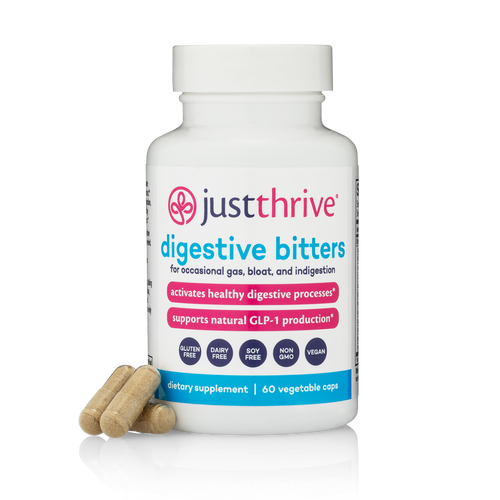Gluten is everywhere. In obvious foods like macaroni and bread, and hidden in surprising places like pickles, licorice, and wine coolers.
For many people, gluten surprises can completely upend a healthy digestion. And because gluten is resistant to the enzymes in your digestive tract, it doesn’t get fully broken down and neutralized the way other proteins do. When those bigger pieces of protein circulate, they can do a surprising amount of damage – even if you don’t feel it right away.
So to make sure gluten doesn’t get the better of you, you’ll want to help your body break it down into more harmless bits. And that takes some specialized support.
But first, have you ever wondered…

Why Does Your Body Hate Gluten?
Gluten is a mix of 2 main proteins—gliadin and glutenin—found in grains like wheat, rye, and barley.[1] And while most people consume gluten regularly, the truth is that absolutely no one can fully digest gluten.[2] Here’s why that’s an issue:
Because your digestive systems cannot break down gluten completely, the best it can hope to do is break it down into smaller pieces called “peptides.” And even though the peptide pieces are smaller, your body treats them like threats. That’s because these peptides are resistant to your natural digestive enzymes, so they linger in this undigested form, triggering a response from your immune system.
how gluten peptides can cause physical reactions, especially if you’re one of the millions of people with some level of gluten sensitivity.[3] Some experts think it affects nearly 20 million people in just the U.S., but most of them don’t know it.

Your Symptoms May Be Gluten-Related
Many people think that gluten-related symptoms are confined to digestive struggles... And sure, gluten can negatively impact the gut and cause gastrointestinal (GI) distress—diarrhea, bloating, foul-smelling gas, abdominal pain. But because gluten can trigger both your immune system and your inflammatory response, gluten symptoms can be felt ANYWHERE in your body.
Surprising symptoms often caused by gluten can include:
- brain fog[4]
- skin rashes[5]
- joint pain[6]
- migraines[7]
- anxiety and depression[8]
- hair loss[9]
- extreme fatigue[10]
- muscle aches[11]
If you’ve been having symptoms that don’t seem to trace back to anything, gluten could be the trigger.
Unfortunately, there’s no simple way to diagnose gluten sensitivity. The only way to know is to completely remove gluten from your diet for 4 weeks. If you feel better, if your symptoms subside or disappear, you’re gluten sensitive. And to confirm that, try eating some gluten after that no-gluten period to see whether any symptoms come back. (Spoiler alert: They probably will.)
You Can’t Completely Avoid Gluten
Going gluten free sounds easy. Just avoid cake, cookies, pasta, pizza, and everything made of wheat—right?
Unfortunately, it’s not that simple. Gluten shows up in dozens of unexpected places, foods you’d never suspect. Here are just a few shocking gluten sources (there are many more):
- Jellybeans
- Ketchup
- Salad dressing
- Soy sauce
- Pickles
- Wine coolers
- Licorice
- Meat substitutes
- Medications (the fillers or the coatings)
What’s more, even foods labeled as gluten-free may not really be.[12] Research shows that 32% of restaurant foods with gluten-free labels contained gluten.[13] The worst of the bunch: “gluten-free” pizzas, with 53%—more than half!—containing gluten.
Seems ridiculously difficult to totally avoid gluten and the harm it can cause. But that doesn’t mean there’s nothing you can do to protect yourself.

Neutralize Gluten When You Can’t Avoid It
Gluten’s harm comes from its resistance to being broken down fully during digestion.
The solution: Give your digestive system an edge with 3 teams of gluten neutralizers.
Team 1: Targeted enzymes, specifically Tolerase G and DPP-IV, are designed to break down gluten into harmless amino acids.[14] These two enzymes act like gluten scissors, cutting the large proteins into tinier, more manageable pieces so your body can process them more easily.
Team 2: Protective probiotics such as Bacillus subtilis HU58™, Bacillus coagulans, and Saccharomyces boulardii that help your gut deal with gluten…
- Bacillus subtilis HU58™ creates compounds called short chain fatty acids[15] that can help your body right itself after a gluten intrusion. Plus, it supports balanced immune responses, which can minimize the gluten effect on your immune system.[16]
- Bacillus coagulans helps break down gluten proteins[17] so your body can have an easier time processing them. It also works quickly to support gastrointestinal (GI) comfort by encouraging the growth and activity of a wide variety of probiotic bacteria.[18]
- Saccharomyces boulardii helps dissolve gliadin proteins[19], soothe occasional GI discomfort[20], and promote nutrient absorption.[21]
Team 3: A compound called Betaine HCl works to increase production of stomach acid which can help weaken gluten for easier digestion. Additionally, Betaine HCI assists with nutrient absorption, which gluten can interfere with.[22]
With this natural support system, your body will be better able to handle gluten… especially the gluten you didn’t mean to eat.
Tame Gluten Fears with Gluten Away
Gluten Away helps your body deal with accidental gluten effectively so you can eat without fear. And since gluten is everywhere, that fear is real. This supportive formula helps break down accidental gluten so you can enjoy continued GI comfort and complete nutrient absorption.
Gluten Away contains:
- Gluten-processing enzymes Tolerase G and DPP-IV
- Gut-friendly probiotics Bacillus subtilis HU58™, Bacillus coagulans, and Saccharomyces boulardii
- Digestive acid booster Betaine HCl
With Gluten Away by your side, gluten will fear you, and you can enjoy your favorite meals with confidence that accidental gluten won’t get the better of you.
Next time you eat, choose Gluten Away so you don’t have to worry about uninvited gluten.
>> Live without the worry of getting “glutened” with Gluten Away.
On the fence about Gluten Away? Worried it won’t work for you? We can put your mind at ease.
Like all Just Thrive products, Gluten Away comes with a Bottom of the Bottle, 100% money back guarantee.
That means you can try Gluten Away to see how well it works for you. And we’re betting it will.
But if for any reason you don’t feel a difference, or you feel like it’s just not for you, simply ask for a full product refund. It doesn’t matter if it’s in 3 months or even 3 years. It doesn’t even matter if the bottle is empty. You’ll get your money back any time, for any reason, no matter what.
Sources
- Balakireva AV, Zamyatnin AA. Properties of Gluten Intolerance: Gluten Structure, Evolution, Pathogenicity and Detoxification Capabilities. Nutrients. 2016 Oct 18;8(10):644.
- Kõiv V, Tenson T. Gluten-degrading bacteria: availability and applications. Appl Microbiol Biotechnol. 2021 Apr;105(8):3045-3059. doi: 10.1007/s00253-021-11263-5. Epub 2021 Apr 10. PMID: 33837830; PMCID: PMC8053163.
- Akhondi H, Ross AB. Gluten Associated Medical Problems. 2022 Oct 31. In: StatPearls [Internet]. Treasure Island (FL): StatPearls Publishing; 2022 Jan–. PMID: 30860740.
- Croall ID, Hoggard N, Aziz I, Hadjivassiliou M, Sanders DS. Brain fog and non-coeliac gluten sensitivity: Proof of concept brain MRI pilot study. PLoS One. 2020 Aug 28;15(8):e0238283. doi: 10.1371/journal.pone.0238283. PMID: 32857796; PMCID: PMC7454984.
- Pasternack C, Hervonen K, Mansikka E, Reunala T, Collin P, Kaukinen K, Salmi T. Persistent Skin Symptoms after Diagnosis and on a Long-term Gluten-free Diet in Dermatitis Herpetiformis. Acta Derm Venereol. 2021 Sep 22;101(9):adv00555. doi: 10.2340/00015555-3914. PMID: 34490466; PMCID: PMC9425629.
- Priyadarshini S, Asghar A, Shabih S, Kasireddy V. Celiac Disease Masquerading as Arthralgia. Cureus. 2022 Jun 28;14(6):e26387. doi: 10.7759/cureus.26387. PMID: 35775059; PMCID: PMC9237855.
- Griauzdaitė K, Maselis K, Žvirblienė A, Vaitkus A, Jančiauskas D, Banaitytė-Baleišienė I, Kupčinskas L, Rastenytė D. Associations between migraine, celiac disease, non-celiac gluten sensitivity and activity of diamine oxidase. Med Hypotheses. 2020 Sep;142:109738. doi: 10.1016/j.mehy.2020.109738. Epub 2020 Apr 11. PMID: 32416409.
- Clappison E, Hadjivassiliou M, Zis P. Psychiatric Manifestations of Coeliac Disease, a Systematic Review and Meta-Analysis. Nutrients. 2020 Jan 4;12(1):142. doi: 10.3390/nu12010142. PMID: 31947912; PMCID: PMC7019223.
- Ertekin V, Tosun MS, Erdem T. Screening of celiac disease in children with alopecia areata. Indian J Dermatol. 2014 May;59(3):317. doi: 10.4103/0019-5154.131468. PMID: 24891687; PMCID: PMC4037977.
- Skjellerudsveen BM, Omdal R, Grimstad T. Fatigue in celiac disease: A review of the literature. JGH Open. 2019 Jan 8;3(3):242-248. doi: 10.1002/jgh3.12134. PMID: 31276043; PMCID: PMC6586565.
- Jericho H, Sansotta N, Guandalini S. Extraintestinal Manifestations of Celiac Disease: Effectiveness of the Gluten-Free Diet. J Pediatr Gastroenterol Nutr. 2017 Jul;65(1):75-79. doi: 10.1097/MPG.0000000000001420. PMID: 28644353.
- Osorio CE, Mejías JH, Rustgi S. Gluten Detection Methods and Their Critical Role in Assuring Safe Diets for Celiac Patients. Nutrients. 2019 Dec 2;11(12):2920. doi: 10.3390/nu11122920. PMID: 31810336; PMCID: PMC6949940.
- Lerner BA, Phan Vo LT, Yates S, Rundle AG, Green PHR, Lebwohl B. Detection of Gluten in Gluten-Free Labeled Restaurant Food: Analysis of Crowd-Sourced Data. Am J Gastroenterol. 2019 May;114(5):792-797.
- Tanner GJ. Relative Rates of Gluten Digestion by Nine Commercial Dietary Digestive Supplements. Front Nutr. 2021 Dec 7;8:784850. doi: 10.3389/fnut.2021.784850. PMID: 34950690; PMCID: PMC8688929.
- Ilinskaya ON, Ulyanova VV, Yarullina DR, Gataullin IG. Secretome of Intestinal Bacilli: A Natural Guard against Pathologies. Front Microbiol. 2017 Sep 1;8:1666. doi: 10.3389/fmicb.2017.01666. PMID: 28919884; PMCID: PMC5586196.
- Huang JM, La Ragione RM, Nunez A, Cutting SM. Immunostimulatory activity of Bacillus spores. FEMS Immunol Med Microbiol. 2008 Jul;53(2):195-203. doi: 10.1111/j.1574-695X.2008.00415.x. Epub 2008 Apr 21. PMID: 18430003.
- Gayathri, D., & Gayathri, D. (2020). Gluten-hydrolyzing probiotics: An emerging therapy for patients with celiac disease (Review). World Academy of Sciences Journal, 2, 14. https://doi.org/10.3892/wasj.2020.55
- Kalman DS, Schwartz HI, Alvarez P, Feldman S, Pezzullo JC, Krieger DR. A prospective, randomized, double-blind, placebo-controlled parallel-group dual site trial to evaluate the effects of a Bacillus coagulans-based product on functional intestinal gas symptoms. BMC Gastroenterol. 2009 Nov 18;9:85. doi: 10.1186/1471-230X-9-85. PMID: 19922649; PMCID: PMC2784472.
- Papista C, Gerakopoulos V, Kourelis A, Sounidaki M, Kontana A, Berthelot L, Moura IC, Monteiro RC, Yiangou M. Gluten induces coeliac-like disease in sensitised mice involving IgA, CD71 and transglutaminase 2 interactions that are prevented by probiotics. Lab Invest. 2012 Apr;92(4):625-35. doi: 10.1038/labinvest.2012.13. Epub 2012 Feb 13. PMID: 22330344.
- Kelesidis T, Pothoulakis C. Efficacy and safety of the probiotic Saccharomyces boulardii for the prevention and therapy of gastrointestinal disorders. Therap Adv Gastroenterol. 2012 Mar;5(2):111-25. doi: 10.1177/1756283X11428502. PMID: 22423260; PMCID: PMC3296087.
- Moré MI. Saccharomyces boulardii CNCM I-745 — die medizinische Hefe verbessert die Funktion intestinaler Enzyme [Saccharomyces boulardii CNCM I-745 - the medicinal yeast improves intestinal enzyme function]. MMW Fortschr Med. 2019 Mar;161(Suppl 4):20-24. German. doi: 10.1007/s15006-019-0290-5. Epub 2019 Mar 20. PMID: 30895510.
- Guilliams TG, Drake LE. Meal-Time Supplementation with Betaine HCl for Functional Hypochlorhydria: What is the Evidence? Integr Med (Encinitas). 2020 Feb;19(1):32-36. PMID: 32549862; PMCID: PMC7238915.














